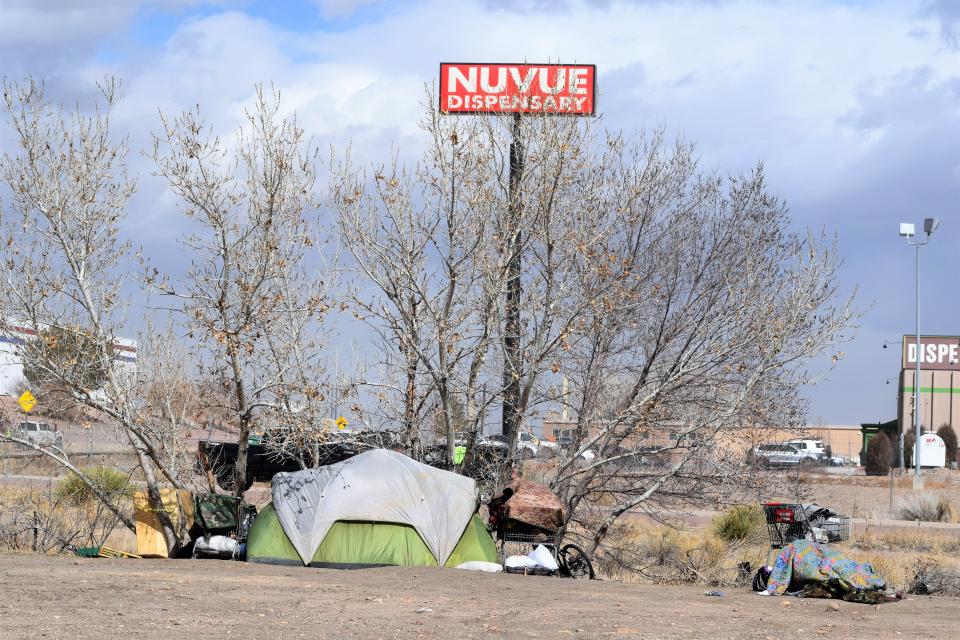Are camping bans constitutional? How a Supreme Court case could impact Pueblo law
A Pueblo law that makes it illegal to camp on public property within city limits could be impacted by the U.S. Supreme Court’s upcoming ruling on whether it's constitutional to punish people for sleeping outside.
Supreme Court justices on Monday weighed the constitutionality of municipal laws that make it illegal for people to camp on public property when they have nowhere else to go. Though the justices aren’t expected to make a ruling until the end of June, they were reportedly divided on the issue after hearing oral arguments from attorneys and stakeholders.
The justices’ ruling could have sweeping implications for the use of public spaces and how cities tackle homelessness.

The court’s liberal justices on Monday were skeptical of the law and wary of giving cities more power to arrest and fine people who sleep outside. Its conservative members questioned whether the nation’s highest court should be involved in the matter, saying local governments should adopt rules on how to tackle homelessness.
The Supreme Court has a 6-3 conservative majority.
In February, Pueblo joined dozens of other cities, including at least a few in Colorado, in adopting laws that prohibit people from camping on public property.
Pueblo’s ordinance stipulates that a person can’t camp on “city property,” meaning any park, roadway, recreation area, open space, or any other land owned by the city. If a person does so, they will be given the option to move into a sheltered space or face a potential fine of up to $1,000 if they refuse.
The ordinance was brought forth by Councilor Regina Maestri, who said public camping can negatively affect Pueblo’s environment and that she felt banning it could help protect the city’s lands. She claimed it had nothing to do with homelessness, a point that was refuted by some of Pueblo's homeless advocates.
A few weeks after the ordinance passed, Mayor Heather Graham called for a meeting in response to the camping ban, saying that “there's room for us to amend this ordinance and help individuals in a more effective way than the current monetary penalty.” She spoke with some of Pueblo’s homeless advocates and nonprofits that assist the unhoused during the meeting.
Councilors Dennis Flores and Sarah Martinez voted against the ordinance, while Maestri, Mark Aliff, Joe Latino, and Roger Gomez supported it.
Why the Supreme Court is tackling the issue
Before Pueblo passed its camping ban, some community members said in public comment that they agreed with Maestri, Aliff, Latino and Gomez. But a majority of people who spoke during that public comment period said they felt the new law would criminalize homelessness.
Similar dissension led to Monday’s Supreme Court hearing: a trio of unhoused people, including Gloria Johnson, sued Grants Pass, a city in Oregon that began to enforce a set of adopted laws that barred people from sleeping and camping outside and imposed hefty fines for doing so.
Johnson and others argued that the city’s laws violated the Eighth Amendment, which prohibits cruel and unusual punishment.
More: Some Pueblo leaders say syringe access programs harm the community. What does the data show?
A district court judge sided with Johnson and others behind the lawsuit, ruling that Grants Pass couldn’t enforce those laws without violating the Eighth Amendment. That decision was upheld a few years later by the Ninth Circuit Court of Appeals.
However, government leaders and the city of Grants Pass, which appealed the lower court ruling, urged the Supreme Court to reconsider it before the justices decided to take on the case.
How the ordinance is shaking out in Pueblo so far
In Pueblo, the impact and enforcement of the new law remains unclear. The city does have some shelter options, but capacity remains a talking point. Capacity at the city's only homeless shelter, the Pueblo Rescue Mission, depends on staffing levels, said Melanie Rapier, executive director of the shelter.
But for the unhoused who do utilize available shelter, it’s unclear where they might stay in the days and weeks thereafter.
The potential fine has also received criticism from Pueblo’s homeless advocates, who believe the unhoused could incur multiple fines with no income to pay them off.
Amelia Emahaiser, co-founder and treasurer of Project Apollo Street Medicine, a Pueblo nonprofit that focuses on harm reduction, called the ordinance “unenforceable and unconstitutional.”
“They’re (out) there because there is nowhere else for them to be,” Emahaiser said. ”They’ve chosen the least desirable patch of land to put their tents in and it’s not good enough. It won’t work out the way city council imagines because it certainly isn't going to run them out. If anything, it’s going to run them out on the streets.”
Unlike other U.S. cities, the majority of Pueblo’s homeless encampments aren’t visible near businesses or sidewalks. A significant portion of them are located along the Fountain Creek area.
A person can’t violate Pueblo’s camping ban if they can’t access other shelter options and the Pueblo Police Department must demonstrate there are alternatives available before they cite someone.
Frank Ortega, spokesperson for Pueblo PD, said the department doesn’t have any current plans to conduct sweeps of homeless encampments in Pueblo. Pueblo Police Chief Chris Noeller said as much when the ordinance first passed.
Ortega said Pueblo PD, as of April 22, had issued one citation since the ordinance passed. A person was cited on April 12 for violating the ordinance near 3200 Mirror Ave.
More Pueblo news: Homicides up 86% in Pueblo; City, FBI officials discuss plans to address rising crime
Chieftain reporter Josué Perez can be reached at JHPerez@gannett.com. Follow him on X, formerly Twitter, at @josuepwrites. Support local news, subscribe to The Pueblo Chieftain at subscribe.chieftain.com.
This article originally appeared on The Pueblo Chieftain: Supreme Court ruling on camping bans could impact Pueblo, Colorado law

